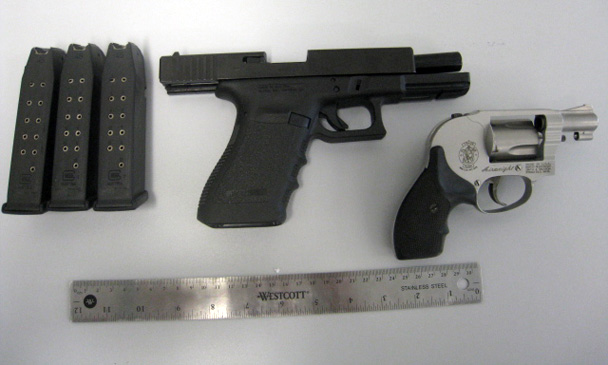The Canada Border Services Agency is pleased to share a sample of October 2013 highlights from its border crossings in Southern Manitoba. This sampling underscores the CBSA’s commitment to keeping our communities safe and ensuring our laws are respected.
Throughout October, CBSA officers processed 61,350 cars and 23,830 commercial trucks at the 16 land border crossings in Southern Manitoba.
At the port of Emerson, Manitoba’s busiest land border crossing, CBSA officers processed 85,250 travellers. They also refused entry to 119 people, many of whom for previous criminal records, issued 89 work permits, 10 study permits, and granted permanent resident status to 250 people. There were also 28 seizure actions, which resulted in more than $24,500 in penalties for travellers who either undervalued or did not declare their goods.
Emerson
On Wednesday October 9, a Manitoba man was importing building supplies. When asked for the total value of the goods, the man hesitated to answer but eventually declared them at $1,300. Officers conducted an extensive examination and determined that the individual had actually paid $25,000 for the supplies. The goods were seized and returned to the man after he paid $11,390 in penalties and taxes. Had he been truthful, he would have only paid $3200 in GST and PST.
On October 10, a 28-year-old Canadian resident arrived at the port after being refused entry into the United States. Background checks revealed he had outstanding charges for possession of child pornography and was on terms and conditions not to travel. Officers searched the contents of his electronic devices and found numerous images of child pornography. Officers also found a large quantity of marijuana in his vehicle. The man was arrested and turned over to RCMP and is facing additional charges.
On October 12, a 53-year-old commercial truck driver was coming to Canada to deliver a load. She stated she had no previous criminal charges, however, database checks revealed a previous conviction for assault with a weapon and child endangerment. She was refused entry to Canada.
That same day, a 52-year-old woman and her 48 year-old husband from South Dakota were coming to visit Canada for the day. The woman had been convicted of five DUI’s and two convictions of impersonation. The male had three DUI convictions and four disorderly conduct convictions. They were both refused entry into Canada and returned to the United States.
On October 14, a North Dakota commercial truck driver arrived at the port, on his way to deliver goods in Winnipeg. Background checks revealed a previous conviction for criminal sexual assault as well as a conviction for abuse/neglect of a child. He was refused entry into Canada.
On October 15, a 23-year-old California resident travelling to Canada for a vacation arrived at the port. Background checks revealed a conviction for sexual touching with a minor. He was refused entry and returned to the United States.
On October 16, a 47-year-old Texas commercial truck driver was en route to Winnipeg to deliver a load when he arrived at the port. Background checks revealed he had a previous conviction for assault causing bodily harm, as well as a conviction for uttering threats to a family/household. He was refused entry and returned to the United States.
On October 18, officers detected the scent of alcohol while speaking to a Manitoba man who had arrived at the port. Officers had the man blow into an alcohol screening device, which rendered a “fail” reading. The man was arrested for driving under the influence of alcohol and turned over to RCMP.
That same day, a family was returning to Manitoba after a day of shopping in the United States. The driver of the vehicle declared $150 worth of goods for the entire family and three cartons of cigarettes. When officers searched their vehicle, they found various undeclared goods valued at more than $900, as well as three additional cartons of cigarettes. The goods and vehicle were seized and returned after a $750 penalty was paid. The undeclared cigarettes were seized and not returned.
The following day, a Manitoba man declared a snowmobile he was importing at $2000. Officers investigated the man’s declaration as the price seemed low and confirmed he had actually paid $4300. Officers seized the snowmobile and the man paid a $485 penalty for its return. Had the man been truthful, he would have only paid $215 in GST.
On October 24, a 25-year-old male arrived at the port and requested a temporary resident permit so that he could travel to Canada to work on a regular basis. The individual had previous convictions for burglary, DUI and disorderly conduct. The permit was denied due to the individual’s criminal history and he returned to the US.
On October 25, a Virginia couple arrived requesting information on importing and selling goods in Canada. They declared no weapons or firearms. Officers examined their vehicle and found two undeclared, loaded handguns. Officers seized the firearms as well as the individual’s vehicle and returned the vehicle once a $2500 penalty was paid. The firearms were not returned and the individuals were refused entry into Canada and returned to the US.

Two handguns seized by CBSA officers from a couple at Emerson on October 25. Both handguns were loaded when officers found them in the vehicle.
On October 3, officers were inspecting parcels from a courier truck and referred a package declared as “vitamins” for further examination. Inside the parcel, officers found a bag of brown powder and a bag of green powder. Officers detained the goods and sent samples to the CBSA lab to determine their composition. On October 27, lab results confirmed that the substance was N, N-Dimethyltryptamine or DMT, which is a hallucinogenic and a controlled substance in Canada. The goods were seized and submitted to the CBSA Intelligence unit for further investigation.
On October 28, a US resident arrived at the port of entry to determine if he would be admissible to Canada as he wanted to become an international truck driver. The individual admitted to being charged with sexual abuse of a minor. The individual was advised that he was not admissible to Canada due to this conviction and returned to the United States.
Winkler
On October 12, an individual arrived at the port and declared a vehicle and accessories at $6,100. Upon further questioning, the individual admitted he had actually paid an additional $1000 for the accessories. The items were seized and the individual paid $350 for their return.
On October 20, a family declared a piece of hunting equipment that had been purchased in the United States. During a secondary examination on the vehicle, officers found various goods that had not been declared. When questioned about these goods, the driver claimed that they had been purchased in Canada and were in their vehicle prior to them entering the United States. Further examination uncovered receipts of the goods from US dealers that indicated they had been purchased that day. In total, all undeclared goods were valued at $800. They paid a $550 penalty for not declaring the items.
Tolstoi
On October 19, a Manitoba man was returning to Canada with camping equipment that he claimed he had brought to the US with him. Officers examined the vehicle and determined all the gear was brand new and still had tags. Officers seized the vehicle and returned it once a $1368 penalty was paid. Had the man been truthful in his declaration, he would have only paid $445 in duties and taxes.
Boissevain
On October 16, a Manitoba man arrived at the port of entry and declared a recreational vehicle at $1500. A further investigation by CBSA officers revealed he had actually paid $4300. The vehicle was seized and a $725 penalty was paid for its return. Had the man been honest he would have only paid $225 in GST.
On October 26, a Saskatchewan man returning to Canada declared a boat he had purchased in the United States at $5500. Officers felt the value appeared low and investigated further. Officers determined the individual had actually paid $7500. The boat was seized and returned to the individual once a $1430 penalty was paid. Had the individual properly declared the boat, he would have only paid $375 in GST.
Travelingto the United States for Black Friday?
In order to minimize wait times at the border, please consider crossing at non-peak times before the afternoon rush begins. You can stay updated on wait times at major ports including Emerson by visiting www.cbsa-asfc.gc.ca/bwt-taf or by subscribing to Border Wait Times on Twitter.
When returning to Canada, have all of your receipts ready and be prepared to make an accurate declaration. The single best thing you can do to save time returning to Canada is to simply be open and honest with the CBSA officer. If you are not sure about what to declare, don’t hesitate to ask. The officers are there to help you.



